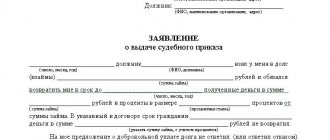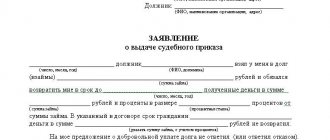A court order is analogous to a court decision. By way of order, you can collect debts directly specified in the Code of Civil Procedure of the Russian Federation. The simplified procedure applies both to the issuance of court orders and to their cancellation. When issuing a document, no proceedings are carried out with the parties summoned and meetings held.
A ruling to cancel a court order is also made based on the objections presented, without evaluating the evidence. Read about the rules for canceling orders that have or have not entered into legal force in this material.
Contents of the court order
The court order must contain the following information:
- name of the court;
- case number;
- date of the order;
- personal data and account details of the applicant;
- FULL NAME. the judge who issued the court order;
- FULL NAME. the debtor, his address of residence, date and place of birth, work data (if known), as well as at least one of his identifiers - SNILS, INN, passport details (or other identification document), OGRNP (if the debtor is an individual entrepreneur ). For the debtor's legal entity - name, address, INN and OGRN;
- indications of the laws and legal acts that served as the basis for satisfying the claims of the claimant;
- the amount of the amount to be recovered (and the penalty), as well as the state duty to be transferred to the budget.
Time limit for objecting to a court order
The period for filing objections to a court order is counted from the day when the debtor received the corresponding judicial act in paper form and is 10 days. Or the period is calculated from the date of expiration of the storage period for judicial mail correspondence, which is seven days.
However, in practice there are cases when, due to objective reasons, the debtor could not receive a court order, for example, due to the fact that he has not lived for a long time at the address where the court order was sent to him, or he has not received any mail at all and I learned about the court order from the bailiffs.
In such cases, the debtor also has the right to appeal to the court with objections to the court order and with a request to cancel it, and, as a rule, the courts cancel the court orders. At the same time, judges are different and it is possible that the order will not be canceled by the judge, but it’s worth a try in any case.
ATTENTION : read more about the restoration of the deadline and watch a video on the topic
In what cases can a court order be issued?
The issuance of a court order is possible only for specific types of claims specified in the Civil Procedure Code of the Russian Federation, including:
- for transactions drawn up in simple written form;
- under notarized contracts;
- when collecting debt for utilities and telephone communications;
- when collecting debts on payments and contributions of members of HOAs and building cooperatives;
- on claims for the collection of alimony debts;
- on delays and non-payment of wages, etc.
Additional commentary on Article 129 of the Code of Civil Procedure of the Russian Federation
The court that issued it may cancel the court order if the debtor raises objections. Article 129 of the Code of Civil Procedure of the Russian Federation does not indicate the reasons that the debtor must put forward when objecting to the execution of a court order, it follows that the debtor may not put forward any grounds, but simply express disagreement in writing with the execution of the court order. Of course, this will allow the debtor to delay the consideration of the conflict, since the plaintiff will have to initiate legal proceedings, which will take time to complete. At the same time, this is also an additional protection for the debtor against unscrupulous creditors.
In the ruling on the cancellation of the court order, the judge explains to the claimant that the stated claim can be presented by him in the manner of claim proceedings. It is advisable to continue the established practice, which consists in the fact that the state duty paid by the claimant when he files a claim against the debtor in the procedure of claim proceedings is counted against the duty payable.
Copies of the court ruling to cancel the court order are sent to the parties no later than three days after the day it was issued. Such a determination cannot be appealed to a court of second instance, since it does not exclude the possibility of further progress of the case and the law does not provide for the admissibility of such an appeal (see commentary to Article 331 of the Code of Civil Procedure).
How long does it take to issue a court order?
The court order is issued within five days from the date the applicant submits the petition to the court. After ten days, the order comes into force, but only if the debtor has not received a statement expressing disagreement regarding the issuance of this document. In this case, the judge (or rather his assistant) gives the applicant a court order, which is stamped. The applicant himself can send it to the bailiff or to the bank where the debtor’s accounts are located. In addition, the claimant has the right to ask the judge to send an order to the FSSP. In turn, the judge has the right to send the order to the bailiffs, both on paper and in electronic format, signing it with an enhanced qualified electronic signature.
The court order was canceled: what should the debtor do next if the bailiffs start writing off money?
When a creditor receives a court order, he has the right to appeal to the FSSP. He comes to the bailiffs and submits an order to initiate enforcement proceedings.
Let's imagine that you have written an objection to a court order. You sent it to the magistrate, who canceled the document. Copies of the cancellation order are sent to the creditor and debtor within 3 days. But bailiffs are not aware of the latest changes! They conscientiously initiate enforcement proceedings and begin various checks. As a result, the debtor’s salary is suddenly deducted.
What to do in such a situation? Of course, the write-off occurred illegally, and this error must be corrected:
- First of all, we will find out who exactly is conducting enforcement proceedings. This can be done through the official website of the FSSP by searching the bailiffs database. You can find yourself by name and date of birth: https://fssp.gov.ru/iss/ip. You will have access to the production number, contact details and name of the bailiff who is handling your case.
- Next, we contact the bailiff and inform him of the error. You will probably have to visit the branch and inform the bailiff of the magistrate's order to revoke the order. In theory, after this the bailiff is obliged to stop the proceedings and transfer the money back to the account.
- If the bailiff does not compromise and does not accept the cancellation order, we write a complaint addressed to the senior bailiff. A complaint can be submitted through the online reception of the portal, in person or sent by registered mail. At the same time, you can complain to the prosecutor's office. Such a need arises, for example, if the bailiff took note of the decision to cancel the order, but is in no hurry to close the proceedings. As a result, you suffer financially from this.
- Within 30 days, complaints are checked and the necessary decisions are made. All you can do is wait.
Cancellation of a court order
A copy of the court order is sent to the debtor at the address specified by the claimant in the application. The debtor has ten days from the date of receipt of a copy of the order to express his disagreement, namely, to send a written statement to the court with objections to the fact of the issuance of the court order. The ten-day period is counted from the date of receipt of the order, that is, from the moment of signing the postal notice or personally receiving the order in court.
Important: there is no need to justify the reasons for disagreement with the court order.
According to Art. 129 of the Code of Civil Procedure of the Russian Federation, the very fact of the debtor’s disagreement is an indisputable basis for canceling the court order.
What is it - an objection to cancel an order
An objection is a special procedural document that is used in writ proceedings. With this document, the defendant (debtor) declares his disagreement with the issued order and asks to cancel it. At its core, an objection resembles a document such as a response to a claim. The response also indicates disagreement with the plaintiff's demands.
A few important points related to filing and consideration of objections:
- the right to file objections arises immediately after the issuance of the order for collection;
- the filing of objections obliges the magistrate to cancel the order if only the debtor met the 10-day deadline;
- Unlike responses in lawsuit proceedings, the arguments of the objections are not studied at the court hearing, i.e. The judge makes a decision on them alone.
The defendant may not file an objection if he agrees with the claimant’s demands. If the document with objections is not received by the court within 10 days, the order will enter into force. The claimant will receive a judicial act certified by a seal and will be able to submit it for execution.
Thus, the only purpose of objections in writ proceedings is to cancel the order for collection. However, after cancellation, legal proceedings may begin. The claimant will retain the right to file a claim. This will be explained in the court’s ruling to cancel the order.
Who can file objections
In writ proceedings there are only two parties - the claimant (applicant) and the debtor (respondent). Obviously, the claimant needs the issuance of an order, and not its cancellation. Therefore, only the defendant (debtor) can raise objections.
After filing a claim, the debtor will again have to defend himself in court proceedings. But the claim will be considered in open hearings, with the positions and evidence of the parties examined. During the claim process, you can also submit objections, reviews and other documents. But the status of the document will be different. The judge is obliged to take into account the arguments in objections and reviews. But the mere fact of filing objections will not lead to the dismissal of the claim.
What does canceling a court order do?
The cancellation of a court order does not cast doubt on the very fact of the existence of a debt, since the objections received from the debtor only indicate the existence of a dispute between the parties. The judge is obliged to cancel the court order, after which the claimant has the right to defend his interests through legal proceedings.
A logical question arises: does it make sense to file an application to cancel the court order if you still have to answer for debt obligations?
Undoubtedly, there is. The debtor has a “temporary reserve” sufficient to prepare for the trial, where the defendant will be able to present evidence that the applicant’s demands are unfounded or take appropriate measures to resolve the situation pre-trial.
In addition, the debtor subsequently receives the right to appeal the court decision through an appeal procedure.
Features of issuing a court order under the Code of Civil Procedure of the Russian Federation
Writ proceedings are much simpler and faster for the claimant than filing a claim and a full trial of the case. On average, an order can be received within 15-20 days after submitting documents for it, if the debtor does not exercise his right and does not raise an objection.
Here are the main nuances associated with issuing collection orders:
- writ proceedings in civil cases are conducted only by magistrates (in economic disputes, orders can be issued by arbitration);
- for issuing an order, the fee is 50% less than when filing a claim;
- by order, you can collect debts under undisputed obligations directly specified in the Code of Civil Procedure of the Russian Federation (this includes alimony as a percentage, loans and borrowings, debts on notary receipts, delays in utility bills, etc.);
- the maximum amount of recovery in writ proceedings under the Code of Civil Procedure of the Russian Federation cannot exceed 500 thousand rubles.
At the request of the claimant, the judge checks the grounds for the occurrence of the obligation, the dates and periods of delay, and the calculation of the amount of debt. No hearings are scheduled in the case, and the judge issues an order within 5 days after receiving the application. In this case, a copy of the document is sent to the debtor, who can exercise the right to appeal.
An application for an order is not a mandatory stage of collection. The creditor can immediately file a claim in court in order to achieve a full hearing of the dispute. This may be more effective, since it is very easy for the debtor to cancel the judicial act in writ proceedings. For the claimant, the cancellation of the order, first of all, entails a delay in the period for receiving the writ of execution.
Disadvantages of a court order for the debtor
If the debtor does not dispute the debt and has no objections regarding the period of delay, then he may not take any action to cancel the order. In this case, he will even save compared to the claim proceedings, since the amount of the collected duty will be less.
But for a debtor who completely or partially disagrees with the grounds for collection and the amount of debt, writ proceedings may lead to the following problems:
- Since the magistrate is not conducting a trial in the case, one cannot rely on the statute of limitations. This allows banks or other creditors to collect arrears beyond the statute of limitations;
- in writ proceedings, it is impossible to submit reviews and counter-calculations, or to reduce the amount of amounts collected;
- When issuing an order under the Code of Civil Procedure of the Russian Federation, the debtor cannot ask the court to reduce the penalty due to its disproportionate nature to the debt.
Even more problems will arise if the credit or other agreement changes the jurisdiction for filing claims or applications to the judicial authorities. The creditor will be able to quickly receive a judicial act and send it to the bailiffs for collection, and as a result, the debtor will find out about this after a significant period of time or after the funds have been written off. Even in this case, it is possible to get the court order canceled, but additional difficulties will arise.
Although the magistrate is required to send a copy of the order to the debtor, problems with this can also arise. For example, if the debtor has changed his residential address, the document will not reach him. In this case, the procedure for appealing and canceling does not change, but you will have to prove the date on which you learned about the collection by order.
How to correctly draw up an application to cancel a court order?
An application to cancel a court order is submitted (in person, through an authorized representative or by mail) to the court body that issued the decision.
The law does not provide for specific requirements for drawing up an application to cancel a court order, but, based on established judicial practice, certain rules must be followed when writing an objection.
The application is made in simple written form - by hand or printed.
- In the upper right corner you should indicate:
- name of the judicial body, surname and initials of the judge;
- surname and initials, registration address (place of residence), telephone number of the applicant.
- Below, in the center of the sheet, the name of the document is written: “Objection.”
- In the main part, the applicant sets out his reasoned disagreement with the court order, indicating the reasons. (This condition is not mandatory).
- The pleading part must express an appeal to the court - a request to cancel the court decision.
- Next, the date is indicated and a personal signature is placed.
How to write an objection to a court order?
Objections to a court order are written in free form.
When filing an objection, you must provide the following information:
- name of the court and full name of the judge who issued the court order
- from whom the objections are filed, i.e. Full name, address, telephone number
- number of the case in which the court order was issued
- title of the document – objections to the court order
- the text of the objections sets out the objections directly and can refer to the rules of law
- at the end the objections are signed by the debtor
Directly in the text of the objections, you can simply indicate that the debtor does not agree with the court order issued and this will be enough to cancel it, which is also indicated in paragraph 31 of the Resolution of the Plenum of the Armed Forces of the Russian Federation dated December 27, 2016 No. 62.
No one forbids in the text of objections, in addition to disagreement with the order, also listing specific objections, so to speak, just in case. However, in order to overturn a court order, the judge is unlikely to examine specific objections, he will only evaluate whether all the conditions that are necessary to overturn the order are met. Still, it’s better to be more specific about your objections.
USEFUL : sample objection to the cancellation of a court order at the link
Missed the deadline for filing an appeal?
A citizen (or individual entrepreneur) has the right to restore the appeal period missed for valid reasons by sending a corresponding petition to the judge. Moreover, if there are good reasons, the debtor may not directly apply for restoration of the deadline. He has the right to submit ordinary objections to the magistrate, additionally indicating the reasons for the omission and justifying them with supporting documents. For example, a certificate from the hospital, a travel certificate, a certificate of change of address, and so on. The Supreme Court of the Russian Federation clarified that this can be done in its Resolution No. 62 of December 27, 2016. However, he clarified that the circumstances that prevented a person from sending objections on time must remain in effect throughout the entire period of appeal, and the objections themselves were sent by the citizen no later than 10 days from the date of termination of these circumstances.
It is much more difficult for a legal entity to justify the validity of the reasons for the untimeliness of objections, since the head of the organization is obliged to organize work in such a way that, in the event of his absence, authorized persons receive postal items.
In each specific case, the issue of restoring the deadline for appeal is decided by the court.
Procedure for filing objections
You can object to the issuance of an order only after it has been issued. The defendant learns about this from a copy of the judicial act sent by mail. If for some reason the debtor does not receive a copy of the order, you can file objections:
- with the restoration of deadlines if a copy of the document is not received for valid reasons (for example, if the court sent a copy of the document to the wrong address);
- indicating the date and circumstances under which the debtor learned about the existence of the order (for example, from a bailiff’s order, from the Data Bank on the FSSP website).
If the order has already begun collection, then an objection to execution is actually filed. In this case, after canceling the order, the bailiff will be obliged to stop all actions aimed at execution. All arrests, restrictions and prohibitions in enforcement proceedings will also be cancelled.
What is the deadline for filing objections?
10 days are given for this. The period is counted from the day the defendant receives a copy of the judicial act. If the document is sent by mail, the date can be easily verified by the signature on receipt. If the defendant did not receive a copy of the document, then when filing objections, you can refer to the date when he learned about the existence of the order.
If the defendant misses the 10-day deadline, the judge will refuse to cancel the order. The judge is obliged to send the debtor a ruling that can be appealed. But it is better not to miss deadlines, or immediately indicate a request for their restoration.
What documents are needed
To correctly draw up objections, you only need a copy of the court order, or information about this document. It is not necessary to submit any other documents along with objections. Even if the debtor presents evidence, calculations, certificates or other documents, the judge will not indicate them in the cancellation ruling.
Where to file objections
Orders for collection are issued only by magistrates. Accordingly, objections must also be submitted to the magistrate who issued the order. You can contact other judicial authorities:
- to the district court
- with a private complaint against the ruling refusing to cancel the order - to the cassation court
- with a complaint against the order that has entered into force.
If the order has already been handed over to the bailiffs for execution, then objections still need to be sent to the magistrate. The decision to cancel the act will be sent to the FSSP by the judge, or this can be done by the debtor himself.
If enforcement proceedings have already been initiated
If the court order has entered into legal force and enforcement proceedings have been initiated against the debtor, then ignoring the requirements can lead to negative consequences. For example, to the seizure of accounts.
However, even in this situation, the debtor does not lose the opportunity to appeal the court order. In the Resolution of the Supreme Court of the Russian Federation mentioned above, it is especially emphasized that a cassation appeal is filed against an order that has entered into force. Today she is sent to the presidium of the court of a constituent entity of the Russian Federation (supreme, regional, regional, etc.). The period for such an appeal is six months from the date of entry into force of the court order. However, it is worth clarifying that the process of cassation appeals against decisions of magistrates’ and district courts will soon undergo serious changes. In accordance with Law No. 1-FKZ of July 28, 2018, a new structure of appeal and cassation courts is being created in Russia. And after the Supreme Court of the Russian Federation notifies in 2021 about the start date of these courts, the court order that has entered into force can be appealed to a new cassation instance.
In addition, it should be remembered that in accordance with Article 39 of the Law on Enforcement Proceedings No. 229-FZ, a judge can suspend enforcement proceedings when the debtor (defendant) challenges the court order in the cassation instance. So, the entry into force of a court order does not mean that it cannot be canceled or enforcement proceedings suspended.
Appeal against a court order that has entered into force
If the order has already entered into force, and the debtor missed the deadline for filing objections, there is another defense option. Any judicial act that has entered into force can be subject to a cassation appeal. The rules for appealing through cassation are specified in Chapter 41 of the Code of Civil Procedure of the Russian Federation.
Deadline for filing a cassation appeal under the Code of Civil Procedure of the Russian Federation
You can apply for cassation within three months after the judicial act has entered into force. This period is provided for in Article 390.3 of the Code of Civil Procedure of the Russian Federation. This rule also applies to orders of magistrates. If you do not have a copy of the order, then the effective date can be clarified in the magistrate's court. If the claimant has already applied to the FSSP, information about the writ of execution can be requested from the bailiff.
Where to file a complaint
The complaint must be filed with the cassation court. These are regional and regional courts in which cassation boards work. The complaint can be submitted to the office of the judicial authority or sent by mail.
Get installments
If the debtor has no objections to the content of the court order, but is temporarily unable to fulfill the demands of the claimant, he has the right to apply to the court that issued the order with a written application for an installment plan or deferment of execution, as well as a change in the order of payments. The appeal should indicate valid reasons, refer to a difficult financial situation or other documented circumstances.
But we must remember that granting a deferment of debt payments is a right, not an obligation, of the judiciary.
Why an application may be needed
Writ proceedings are carried out without calling the parties. The judge single-handedly considers the applicant's claim and, based on the data available in the case, issues an act, which is also an executive document (Article 121 of the Code of Civil Procedure of the Russian Federation, Article 229.1 of the Arbitration Procedure Code of the Russian Federation, Article 123.1 of the Code of Arbitration Procedures of the Russian Federation). The plaintiff's claim is satisfied because the defendant does not provide any explanation. The most common cases of such a shortened procedure are used in cases of debt collection on loans, housing and communal services, and taxes.
Since the parties to the process are not summoned and do not know about the existence of the case, they learn about the adopted decision only when they receive a copy by mail or even when execution begins.
If the debtor does not agree with the satisfied demands of the collector, it is necessary to send objections so that when the case is reconsidered, he will have the opportunity to be present at the meeting and object to the plaintiff’s demands.
Arbitration court order
Since the summer of 2021, the court order has begun to be used in the practice of arbitration proceedings. Courts of first instance received the right to issue court orders, but only on the basis of a corresponding request in the statement of claim on behalf of the claimant.
An arbitration court order is issued in cases of non-fulfillment or improper fulfillment of the terms of contracts, when the amount of debt does not exceed 400,000 rubles, or when collecting mandatory payments and sanctions in the amount of no more than 100,000 rubles.
To be fair, it should be said that arbitration courts issue court orders much less often than magistrates. This is explained by the fact that collectors simply do not include a request for a court order in the application. Therefore, the case is considered in the usual manner (Article 229.3 of the Arbitration Procedure Code of the Russian Federation). And if you familiarize yourself with judicial practice, you can come to the conclusion that most often the bodies of the Pension Fund of the Russian Federation are asked to issue a court order. They actively use this tool to collect payments and penalties. (Court order of the Administrative Court of the Krasnodar Territory in case No. A32-34565/2018 dated 09/04/2018).
How to file an objection to a court order?
You can file objections to a court order in the following ways:
- bring directly to the court and submit through the reception desk with a mark on your copy
- send objections by registered mail in Russia with notification
- file objections through a representative who has a power of attorney to file objections
- Objections can be sent to the arbitration court electronically through the “My Arbitr” system, but sending them to magistrates is not easy, since the websites of magistrates do not provide for the possibility of filing objections electronically. You can try to clarify this information at a specific court site; perhaps a specific judge practices sending objections by e-mail. However, there is no procedural provision for sending objections by email.
Thus, the most reliable methods of filing objections are filing through the reception desk or sending them by Russian post.
conclusions
So, any court order that has not entered into force can be easily canceled. It is enough to simply send your objections within the period specified by law and the court will certainly cancel it. Moreover, even if the deadline is missed for good reasons, the court can make a ruling and cancel the court order. That is, the legislation is very loyal to the debtor in the process of writ proceedings. However, you should not be deluded by this - after the court order is canceled, legal proceedings begin, which, as a rule, ends with a decision to collect the debt. Therefore, we urge readers, immediately after receiving information about the issuance of a court order, to seek help from professional lawyers who will be able to assess all the risks, formulate the necessary arguments and defend your interests in court.
Rate this page!
[Total: 2 Average: 4.5]
Why shouldn’t you count on the lender’s forgetfulness?
The third option for the outcome of events after the cancellation of the court order is similar to a rose-colored dream - the creditor is completely .... forgets about his claims. Or “scores” - it’s who likes what better.
Alas, the lender’s forgetfulness is a utopia.
The reality will be like this
What awaits the debtor? Alas, troubles
If the lender is a bank or microfinance organization
You shouldn't count on forgetfulness. These are serious organizations that are included in the monitoring and work of the Central Bank. They operate strictly following the bureaucratic requirements of the law. Each issued credit or loan is recorded in the internal register of these companies and goes through reporting to the Central Bank.
Even if your bank branch is closed, information about loans is still stored in the central database of this bank.
In rare cases, an MFO or bank can forget about the statute of limitations or miss the time to apply for inclusion in the register of creditors.
But they will never forget about your debt; this is impossible due to the total recording of relationships with individuals in documentary form.
If the creditor is an individual
For example, the alimony claimant is the ex-spouse; or an old friend lent you money, to whom you now owe money, and so on. Moreover, you should not rely on the lender’s forgetfulness. Practice shows that collection by individuals can take the form of an action-packed drama. Such creditors are ready to go all the way to the Supreme Court, the European Court of Rights (ECHR), and even the Afghan Taliban, just to get at least 50% of their money back.
The dispute that was considered in the Constitutional Court on April 26, 2021 (Resolution No. 15-P) was very indicative in this regard. The dispute arose between the parties over a debt that was outstanding by the debtor back in 1999. For all time until 2016-2017. (when the debtor began to go bankrupt) the debt increased from 700 thousand rubles to 4.5 million rubles. The creditor did not calm down until he reached the Constitutional Court and did not achieve the desired decision.
If collectors act as collectors
They use strict collection methods, that is, the debtor is processed at the highest possible speed in pursuit of debts. Of course, most collection agencies try to comply with No. 230-FZ, but still, their interest in debt collection is sometimes so high that they are ready to violate the law.
Therefore, you shouldn’t count on collector’s forgetfulness? Yes, even if they fail to collect at least 10% of the debt from you, they will certainly not forget to settle the loan debt.
Judicial practice under Article 129 of the Code of Civil Procedure of the Russian Federation
Resolution of the Plenum of the Supreme Court of the Russian Federation dated December 27, 2016 N 62 “On some issues of application by courts of the provisions of the Civil Procedure Code of the Russian Federation and the Arbitration Procedural Code of the Russian Federation on writ proceedings”
25. The debtor has the right to refer to the expiration of the limitation period, disagreement with the early repayment of the debt amount, as well as the presence of grounds for reducing the amount of the penalty (fine, penalty) in objections regarding the execution of the court order, which in this case is subject to cancellation by the magistrate, arbitration court (Article 129 of the Code of Civil Procedure of the Russian Federation, part 4 of Article 229.5 of the Code of Arbitration Procedure of the Russian Federation).
28. The court order is prepared by the magistrate in two copies on paper. A copy of this court order can additionally be made in the form of an electronic document (part one of Article 13, part three of Article 127 of the Code of Civil Procedure of the Russian Federation).
The first copy of the court order on paper is attached to the materials of the writ proceedings, the second copy remains in the materials of the writ proceedings until the expiration of the deadline for the debtor to submit objections regarding the execution of the court order (Article 129 of the Civil Procedure Code of the Russian Federation, part 6 of Article 229.5 of the Arbitration Procedure Code of the Russian Federation).
If the debtor fails to submit objections within the prescribed period, the second copy of the court order that has entered into legal force is certified with the official seal and sent to the claimant by registered mail with acknowledgment of receipt, unless the claimant has received a request for the issuance of a court order in his hands or for sending a court order to execution on paper or in the form of an electronic document (part one of article 130 of the Code of Civil Procedure of the Russian Federation, part 6 of article 229.5 of the Arbitration Procedure Code of the Russian Federation).
31. A court order is subject to cancellation by a magistrate or an arbitration court if the debtor raises objections regarding its execution within ten days. Such objections can only contain an indication of the debtor’s disagreement with the court order (Article 129 of the Civil Procedure Code of the Russian Federation, Part 4 of Article 229.5 of the Arbitration Procedure Code of the Russian Federation).
Objections received from one of the joint debtors entail the cancellation of the court order issued against all debtors.
A ruling is issued to cancel a court order, which is not subject to appeal.
Resolution of the Plenum of the Supreme Court of the Russian Federation dated December 26, 2017 N 56 “On the application of legislation by courts when considering cases related to the collection of alimony”
Requirements for the collection of alimony, within the jurisdiction of the magistrate, are resolved by the magistrate in the order of writ proceedings (Chapter 11 of the Code of Civil Procedure of the Russian Federation) or in the manner of claim proceedings (Chapter 12 of the Code of Civil Procedure of the Russian Federation).
In accordance with paragraph five of Article 122 of the Code of Civil Procedure of the Russian Federation, a judge has the right to issue a court order if a demand is made for the collection of alimony for minor children, not related to establishing paternity, challenging paternity (maternity) or the need to involve other interested parties. On the basis of a court order, alimony for minor children cannot be collected in a fixed amount of money, since resolving this issue involves the need to verify the presence or absence of circumstances with which the law connects the possibility of such collection (Article 83, paragraph 4 of Article 143 of the RF IC).
In the event of filing an application for a court order for alimony claims that are not subject to resolution in the order of writ proceedings (for example, the debtor pays alimony by court decision to other persons; a claim is made for the collection of alimony in a fixed sum of money or simultaneously in shares and in a fixed monetary amount amount; along with the demand for the collection of alimony in proportion to the earnings and (or) other income of the parents, a demand was made for the recovery of alimony on the basis of the second paragraph of paragraph 2 of Article 107 of the RF IC for the time preceding the filing of the specified application), the judge refuses to accept the application for issuing a court order under paragraph 3 of part 3 of article 125 of the Code of Civil Procedure of the Russian Federation.
If, after the issuance of a court order on a claim for alimony from the debtor within the prescribed period, objections are received regarding its execution, the judge, in accordance with Part 1 of Article 129 of the Code of Civil Procedure of the Russian Federation, issues a ruling to cancel the court order and explains to the claimant that the stated demand can be presented by him in the manner of a claim. production.
If a statement of claim is filed for claims for alimony that are subject to resolution in the order of writ proceedings, the judge returns the statement of claim under clause 1.1 of part 1 of Article 135 of the Code of Civil Procedure of the Russian Federation.
When is the debtor considered to have received the order?
The court sends the letter to the legal address.
If the organization or individual entrepreneur is not located at this address, and the corresponding changes have not been made to the Unified State Register of Legal Entities or the Unified State Register of Individual Entrepreneurs, then the letter is considered to have been received by the addressee.
Another situation: if the letter is delivered, but the debtor avoids receiving it, for the court this will mean that a copy of the order was received by the debtor.
In this case, the date of delivery of the order will be the expiration of the period for storing postal correspondence.
If it is impossible to deliver them, postal items of the “Judicial” category are stored at the post office for seven days. When calculating the period, the day of receipt and the day of return of the postal item, non-working holidays are not taken into account.









